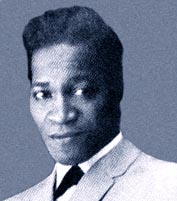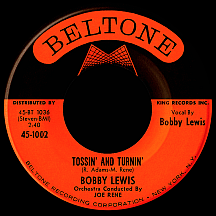BOBBY LEWIS
Tossin' and Turnin'
There's no surefire way to guarantee a hit record, particularly where singers or musicians who aren't very well known are concerned, so it must have come as a glorious shock to Bobby Lewis when, after spending nearly a decade on the lower rungs of the music business, his recording of "Tossin' and Turnin'" became one of the biggest hits of all time. It isn't one of those songs that made everyone go "Wow!" when it first came out; rather, it steadily worked its way into the consciousness of radio listeners, reaching number one three months after release and remaining there longer than any other single of 1961.
Bobby's life has certainly had its share of highs and lows. Born in 1933, he grew up in an orphanage and was adopted at age 12 by a family in Detroit. During childhood, piano playing was his obsession; as a teenager he returned to the city of his birth, Indianapolis, and sang for a short time with the orchestra of Leo Hines, a popular local bandleader. He made his first record at 19 with Leroy Kirkland's orchestra; "Mumbles Blues" (he wrote it with Kirkland), released in 1952 on Chess, reveals a talented, mature singer (the song's 'mum-a-mum-mum...' vocal jabber notwithstanding), yet a few years passed before he found his way back into a recording studio. His second release, a more frantic remake of "Mumbles Blues" on the Spotlight label in 1957, was picked up some months later by Mercury Records. Bobby waxed "Yay Yay I Feel So Gay" for Mercury; a review in Billboard described the song as "vociferous," an accurate description of his over-the-top approach to music-making.
That same disorderly style was evident, if not a notch more chaotic, on a single Lewis did for Roulette in 1959, "You Better Stop" backed with "Fire of Love." He certainly wasn't shy or reserved, but perhaps the best move towards achieving a hit was to dial back the deliriousness a bit. During his brief time at the label he met Ritchie Adams, a songwriter and lead singer of The Fireflies, a group that made just one single for Roulette (doing considerably better later that year with "You Were Mine," a hit on the Ribbon label). Bobby's persistence got him in the door as a performer in many nightclubs; while making the rounds in New York, he and Ritchie contacted Les Cahan at the Beltone Sound Studio, which had been active for several years; they ended up with the first two releases on the company's offshoot, Beltone Records, started in an attempt to garner a larger share of profits from the studio's recorded output. Ritchie's solo 45, "No Mistakin' it," misfired, but the label's second disc, Lewis's "Tossin' and Turnin'," a cleverly-conceived ditty by Adams and Malou Rene, wife of Beltone's A&R director and bandleader Joe Rene, fared much better.

Everyone has "tossed and turned" at some point ('I kicked the blankets on the floor...turned my pillow upside down...') as the result of a romance-induced sleeplessness ('The clock downstair was strikin' four...couldn't get you off my mind...'). Rene's orchestra set the stage for Bobby's vocal, Adams played a twangin' guitar and backing vocals were supplied by girl group The Swanettes, who followed with their own single, "Nothing But the Blood," Beltone's third release. Disc jockeys were slow to realize the potential of Bobby's record; Cahan felt he had at least a mid-sized hit and worked overtime to bring radio and retailers on board. A gradual mover after its national chart debut in April 1961, the record topped the pop chart in July, then locked up the number one spot through September (seven weeks pop, ten weeks on the R&B charts). Lewis had accomplished the unthinkable: "Tossin' and Turnin'" was the year's biggest hit.
"One Track Mind" (written by Malou Rene and Lewis), another catchy song ('A lot of people like to go on trips...others stay at home and read the comic strips...but all I wanna do is kiss your lips!') came on strong while the first single was still hot and spent a week in the top ten in September; for that summer, at least, it seemed there were no singers more popular than Bobby Lewis. But his bright burst of fame dimmed rather quickly, a common occurrence, though a hit the magnitude of "Tossin'" would certainly provide hope for a longer run. "What a Walk" followed the one-two punch with a brief chart appearance in November (the 'crazy little girl' with a distracting left-right wiggle is revealed in the lyrics to be a 'tiny little puppy dog'). The next 45, "Mamie in the Afternoon" (from the Broadway musical A Family Affair), predictably set to a "Tossin'"-type arrangement, received only a smattering of exposure in early '62. It all came full circle by the sixth single, "I'm Tossin' and Turnin' Again," a shameless rehash of Bobby's signature hit that barely charted in July, a full year after the original recording had dominated the airwaves.
Beltone had come strong out of the gate with Lewis and The Jive Five, another hot Les Cahan discovery, but by 1963 the record label was on its last legs; Lewis departed after nine singles and one album. A couple of 45s on ABC-Paramount in '64 ("That's Right" and "Stark Raving Wild") leaned a little closer to his unbridled '50s rants. After a long stretch, "Soul Seekin'" appeared on Philips in 1968. Bobby settled in Newark, New Jersey, and struggled much of his life with vision problems that had begun as a child. He was a frequent participant in oldies revival shows, routinely receiving standing ovations after many a rousing version of "Tossin' and Turnin'." Near blind later in life, he nevertheless continued performing well into the 21st century.
He managed to avoid being confused with the other Bobby Lewis, a lute-plucking country singer from Kentucky who had, like himself, begun making records in the early 1950s; he played at the Grand Ole Opry, appeared often on television, and was doing a rockabilly thing (on a couple of singles for the Saber label) at about the time R&B Bobby made a splash with 1961's top song. Country Bobby finally scored a hit in 1966 ("How Long Has it Been"), the first of more than two dozen mostly mid-chart country ballads throughout the '60s and '70s, though he probably isn't as well remembered today as his urban namesake. Still, it was convenient that the two singers named Bobby Lewis experienced their career peaks at different times.


